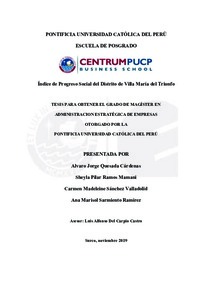| dc.contributor.advisor | Del Carpio Castro, Luis Alfonso | |
| dc.contributor.author | Quesada Cárdenas, Alvaro Jorge | |
| dc.contributor.author | Ramos Mamani, Sheyla Pilar | |
| dc.contributor.author | Sánchez Valladolid, Carmen Madeleine | |
| dc.contributor.author | Sarmiento Ramírez, Ana Marisol | |
| dc.date.accessioned | 2020-02-22T16:58:52Z | |
| dc.date.available | 2020-02-22T16:58:52Z | |
| dc.date.created | 2019-11 | |
| dc.date.issued | 2020-02-22 | |
| dc.identifier.uri | http://hdl.handle.net/20.500.12404/15979 | |
| dc.description.abstract | El Índice de Progreso social [IPS] es una medición que se realiza a nivel mundial y
cuyo propósito es determinar el progreso social de una determinada población. Su análisis se
realiza bajo un esquema holístico, debido a que comprende la medición de varios parámetros,
los cuales se encuentran interrelacionados entre sí. El desarrollo del IPS comprende tres
dimensiones: (a) Necesidades Humanas Básicas, (b) Fundamentos del Bienestar y (c)
Oportunidades, mediante las cuales se evalúa el progreso social de las personas (CENTRUM
Católica & Social Progress Imperative, 2017a). El objetivo de este trabajo de investigación
fue calcular el IPS del distrito de Villa María del Triunfo [VMT], ubicado en la provincia de
Lima. Con ello se buscó identificar las necesidades reales de la población, identificando
aquellos indicadores que más afectan el progreso social del vecino, además se brindan las
recomendaciones para mejorar su calidad de vida.
El tipo de investigación desarrollado fue descriptivo, cuantitativo y no experimental.
Se identificaron tres macrozonas en el distrito de Villa María del Triunfo. Asimismo, para
obtener información primaria, se realizaron 472 encuestas a los jefes de hogar, también se
consultó información secundaria de entidades estatales. Con esta información se validaron las
tres dimensiones y se realizaron pruebas estadísticas a fin de obtener el IPS final del distrito y
de cada macrozona. Se evidenció que el distrito de VMT presenta diversas carencias, frente a
las cuales, las autoridades no han podido cubrir las necesidades básicas, ni brindar el
bienestar necesario, ni oportunidades para mejorar la calidad de vida de la población.
Finalmente se concluyó que el IPS del distrito de VMT es bajo, llegando sólo a 48.77 puntos,
para lo cual se plantearon recomendaciones que pueden ser implementadas por el gobierno
local o por los diversos grupos de interés que se encuentran en el distrito de VMT. | es_ES |
| dc.description.abstract | The Social Progress Index [IPS] is a measurement that is carried out worldwide and
whose purpose is to determine the social progress of a given population. Its analysis is
performed under a holistic scheme, because it includes the measurement of several
parameters, which are interrelated with each other. The development of the IPS comprises
three dimensions: (a) Basic Human Needs, (b) Fundamentals of Wellbeing and (c)
Opportunities, through which the social progress of people is evaluated (CENTRUM Católica
& Social Progress Imperative, 2017a). The objective of this research work was to calculate
the IPS of the district of Villa María del Triunfo [VMT], located in the province of Lima.
This sought to identify the real needs of the population, identifying those indicators that most
affect the social progress of the neighbor, in addition to providing recommendations to
improve their quality of life.
The type of research developed was descriptive, quantitative and non-experimental.
Three macro zones were identified in the Villa María del Triunfo district. Likewise, to obtain
primary information, 472 surveys were conducted on the heads of household, secondary
information from state entities was also consulted. With this information the three dimensions
were validated, and statistical tests were carried out in order to obtain the final SPI of the
district and of each macro zone. It was evidenced that the VMT district has several
shortcomings, against which, the authorities have not been able to cover the basic needs, nor
provide the necessary welfare, nor opportunities to improve the quality of life of the
population. Finally, it was concluded that the SPI of the VMT district is low, reaching only
48.77 points, for which recommendations were made that can be implemented by the local
government or by the various stakeholders that are in the VMT district. | es_ES |
| dc.language.iso | spa | es_ES |
| dc.publisher | Pontificia Universidad Católica del Perú | es_ES |
| dc.rights | info:eu-repo/semantics/openAccess | es_ES |
| dc.rights.uri | http://creativecommons.org/licenses/by-nc-nd/2.5/pe/ | * |
| dc.subject | Indicadores sociales--Perú--Villa María del Triunfo (Lima : Distrito) | es_ES |
| dc.subject | Indicadores económicos--Perú--Villa María del Triunfo (Lima : Distrito) | es_ES |
| dc.subject | Investigación cuantitativa | es_ES |
| dc.title | Índice de progreso social del distrito de Villa María del Triunfo | es_ES |
| dc.type | info:eu-repo/semantics/masterThesis | es_ES |
| thesis.degree.name | Maestro en Administración Estratégica de Empresas | es_ES |
| thesis.degree.level | Maestría | es_ES |
| thesis.degree.grantor | Pontificia Universidad Católica del Perú. CENTRUM | es_ES |
| thesis.degree.discipline | Administración Estratégica de Empresas | es_ES |
| renati.advisor.dni | 07535773 | |
| renati.advisor.orcid | https://orcid.org/0000-0001-9084-1193 | es_ES |
| renati.author.dni | 40700098 | |
| renati.author.dni | 43163701 | |
| renati.author.dni | 20078790 | |
| renati.author.dni | 40496123 | |
| renati.discipline | 413307 | es_ES |
| renati.level | https://purl.org/pe-repo/renati/level#maestro | es_ES |
| renati.type | https://purl.org/pe-repo/renati/type#tesis | es_ES |
| dc.publisher.country | PE | es_ES |
| dc.subject.ocde | https://purl.org/pe-repo/ocde/ford#5.02.04 | es_ES |






